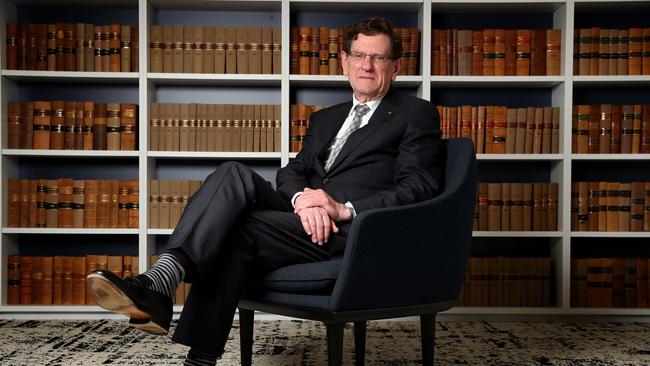Former chief justice Robert French speaks up for indigenous voice
Former High Court chief justice Robert French has laid out a way to enshrine an indigenous voice.

Former High Court chief justice Robert French has laid out a way to enshrine an indigenous voice to parliament in the Constitution without creating a “third chamber” — a strategy that could eliminate some of the most strident objections to the new body.
Mr French, chief justice from 2008 to 2017, argues in an essay in The Australian today that recognising indigenous Australians in the Constitution can be made practical through a constitutionally supported indigenous voice.
Robert French: Voice of reason not beyond us
He says parliament should determine, by legislation, the mode of selection, form and functions of an indigenous voice. It should be able to adjust that legislation from time to time.
“The Constitution can provide for a voice to the parliament in a number of ways,” Mr French writes. “In theory, the Constitution itself could establish and spell out in detail its function, composition and means of selection. That kind of provision, however, would be likely to introduce undesirable and unworkable rigidity.
“Alternatively, and preferably, the Constitution should provide, in spare terms, for the existence of the voice as an advisory body.
“It should be left to the parliament to establish its detailed design by legislation.”
Mr French writes that recognition of indigenous Australians is embedded in native title law and it is part of knowing who we are as a nation.
“Recognition in the Australian Constitution would reflect an existing national growth of respect for our First Peoples and thus for the whole of the full, rich and long history of the peoples of this continent,” he says.
“Recognition and the respect that comes with it can be given and made practical at a national level through the constitutionally supported mechanism of a ‘voice’ to the parliament.”
As inaugural president of the National Native Title Tribunal, Mr French oversaw some of the earliest disputes and agreement-making under the laws that resulted from Eddie Mabo’s landmark case.
The voice proposal is the most contentious element in a sweeping movement that began as a campaign for constitutional recognition of indigenous Australians. Minister for Indigenous Australians Ken Wyatt has declared he will take the nation to a referendum on constitutional recognition within three years.
Mr French’s predecessor as High Court chief justice, Murray Gleeson, has rejected the often-repeated claim that the voice would act as a “third chamber” of parliament.
Mr Gleeson said a fortnight ago that the proposal for a new advisory body called the voice was a “worthwhile objective” to help governments draft policies that affected indigenous people.
Mr Gleeson, who served as High Court chief justice from 1998 to 2008, believes the voice set out in the 2017 Uluru Statement from the Heart could be created through legislation — with only minimal references in the Constitution — without eroding the power of the nation’s politicians.
Mr French makes a similar argument.
While Mr Wyatt says indigenous Australians will have a voice, he has indicated he does not believe it needs to be constitutionally enshrined to be effective.
Scott Morrison is against putting an indigenous voice in the Constitution.
During Labor’s partyroom meeting yesterday, senator Pat Dodson told party MPs that the Prime Minister had “decoupled” constitutional recognition from the Uluru Statement from the Heart, declaring the government’s co-design process had “no structure for formal consultation with First Nations”.
He said it was a “very serious matter” the recognition process was “effectively back to pre-Uluru” with Mr Morrison ruling out supporting a constitutionally enshrined voice.
Senator Dodson, known as the father of reconciliation, said Mr Wyatt had not consulted Aboriginal leaders but “has a plan for consultation with the Coalition backbench and apparently Pauline Hanson”.
“The challenge for us now is to assist the minister without walking away with all the fleas and the ticks that would undermine a principled position,” Senator Dodson said.
Opposition indigenous affairs spokeswoman Linda Burney said there were no plans for formal protests against the government’s position “at this point”. She said Labor’s position was to work collaboratively with the government to bring it towards supporting a constitutionally enshrined voice.
One Labor MP declared it reminded him of John Howard’s refusal to apologise to indigenous people because of the stolen generation.




To join the conversation, please log in. Don't have an account? Register
Join the conversation, you are commenting as Logout